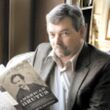My thoughts be bloody: the bitter rivalry between Edwin and John Wilkes Booth that led to an American tragedy
Description
More Details
Also in this Series
Published Reviews
Booklist Review
If one chooses to do so, one could probably discover a complex of personal demons that supposedly motivated every lone political assassin. So Oswald was acting out his frustration over his failures as a husband and political activist. Sirhan Sirhan was seeking relief from loneliness rather than striking a blow for Palestine. And so on and so on to the point of absurd psychobabble. Yet, given the limitations inherent in such efforts, this is actually a very well-done examination of the trials and tribulations of a remarkable family. The family patriarch, Junius, was a heralded Shakespearean actor, an alcoholic, and an often emotionally abusive parent. His favored son, Edwin, was generally regarded as the greatest American actor of the nineteenth century. Then there was poor John desperate for his father's approval, intensely jealous of his brother, and frustrated by his reputation as a mediocre performer. Titone does a fine job of contrasting the personalities and even the acting styles of the brothers. Her portrait of Edwin as a decent man haunted by his brother's act is often moving.--Freeman, Jay Copyright 2010 Booklist
Publisher's Weekly Review
This account of the fraternal conflict between Edwin Booth-one of the most acclaimed Shakespearean actors of his era-and his less successful brother John Wilkes, who would soon achieve another, far darker brand of immortality for his own dramatic act, is read by John Bedford Lloyd, whose placid tone belies an undertone of menace. His reading is solid but uninspired-a surprising tone for a book that is itself about the lives of two singular dramatists. The audiobook also offers an introduction read by Doris Kearns Goodwin, who good-naturedly, if slightly awkwardly, pays tribute to the quality of Titone's scholarship. A Free Press hardcover. (Oct.) (c) Copyright PWxyz, LLC. All rights reserved.
Library Journal Review
Provocative and revealing, Titone's first book provides another dimension to an iconic national calamity by alleging that John Wilkes Booth assassinated Abraham Lincoln in part to establish his own importance within a family of theatrical rivals. Titone contends that the feared, idolized, alcoholic but legendary father Junius Brutus Booth favored elder brother Edwin, who bore Junius's talents and faults, over John by taking him on tour, setting the stage for the latter's treacherous act. While most readers will agree that correlation is not causation, Titone's theory (largely based on Booth sister Asia's writings) adds to the narrative while not dismissing the political and cultural reasons for Wilkes Booth's plot-his Confederate and proslavery sympathies have often been noted. Titone portrays wide-ranging milieus from Baltimore to the California gold fields to Panama to New York as important contexts for the Booth family saga. She is most impressive in her use of primary sources and in her literary style, less strong in her use of secondary works, citing general histories in her bibliography but omitting specific studies of Booth. Meticulous readers will want to compare this book with Michael Kaufmann's American Brutus and Edward Steers's Blood on the Moon, among others. VERDICT Titone challenges her readers to view Lincoln's assassination as the result of a dispute between brothers just as the Civil War was at the national level. Her book should attract both scholars and general readers.-Frederick J. Augustyn Jr., Library of Congress (c) Copyright 2010. Library Journals LLC, a wholly owned subsidiary of Media Source, Inc. No redistribution permitted.
Kirkus Book Review
A collective biography of the celebratedand reviledBooth family of actors.In her debut, historical researcher Titone adopts the emerging biographical technique of examining a family instead of an individual (e.g., Paul Fisher'sHouse of Wits: An Intimate Portrait of the James Family, 2008). Although it's difficult to keep the spotlight away from murderous John Wilkesunsurprisingly, he dominates the final chaptersthe author does a remarkably thorough job of illuminating the lives of his parents and siblings, most notably older brother Edwin, a 19th-century stage mega-star who once played Hamlet on 100 consecutive nights and dined with President Lincoln, a fan. Titone begins with a tribute to Edwin on New Year's Eve, 1892, a gala function attended by President Grover Cleveland. The author then moves back to England in the 1820s, where Junius Brutus Booth (Edwin and John's father), a notable London actor, was fleeing to America, abandoning his wife and child, in company with pregnant Mary Ann Holmes. After providing the relevant back stories, the author relates the astonishing American success of Junius Brutus, and notes the fierce secrecy about his marital life (it later crumbled). Three of the sons became actors, but Edwin had the greatest talent and eventually became wealthy and influential. John Wilkes, writes Titone, had great ambition and a matinee idol's looks, but little thespian ability. Though his surname gained him gigs, he rarely impressed either critics or audiences. The three brothers once did a benefit performance ofJulius Caesar together, and had plans forRomeo and Juliet at the time John Wilkes was off interruptingOur American Cousin in Washington, D.C. After the assassination, Edwin never again uttered his brother's name publicly.Though some historical detail seems more tangential than pertinent, the multiple portraits display hidden facets of all the Booths.]] Copyright Kirkus Reviews, used with permission.
Booklist Reviews
If one chooses to do so, one could probably discover a complex of personal demons that supposedly motivated every lone political assassin. So Oswald was acting out his frustration over his failures as a husband and political activist. Sirhan Sirhan was seeking relief from loneliness rather than striking a blow for Palestine. And so on and so on to the point of absurd psychobabble. Yet, given the limitations inherent in such efforts, this is actually a very well-done examination of the trials and tribulations of a remarkable family. The family patriarch, Junius, was a heralded Shakespearean actor, an alcoholic, and an often emotionally abusive parent. His favored son, Edwin, was generally regarded as the greatest American actor of the nineteenth century. Then there was poor John—desperate for his father's approval, intensely jealous of his brother, and frustrated by his reputation as a mediocre performer. Titone does a fine job of contrasting the personalities and even the acting styles of the brothers. Her portrait of Edwin as a decent man haunted by his brother's act is often moving. Copyright 2010 Booklist Reviews.
Library Journal Reviews
Provocative and revealing, Titone's first book provides another dimension to an iconic national calamity by alleging that John Wilkes Booth assassinated Abraham Lincoln in part to establish his own importance within a family of theatrical rivals. Titone contends that the feared, idolized, alcoholic but legendary father Junius Brutus Booth favored elder brother Edwin, who bore Junius's talents and faults, over John by taking him on tour, setting the stage for the latter's treacherous act. While most readers will agree that correlation is not causation, Titone's theory (largely based on Booth sister Asia's writings) adds to the narrative while not dismissing the political and cultural reasons for Wilkes Booth's plot—his Confederate and proslavery sympathies have often been noted. Titone portrays wide-ranging milieus from Baltimore to the California gold fields to Panama to New York as important contexts for the Booth family saga. She is most impressive in her use of primary sources and in her literary style, less strong in her use of secondary works, citing general histories in her bibliography but omitting specific studies of Booth. Meticulous readers will want to compare this book with Michael Kaufmann's American Brutus and Edward Steers's Blood on the Moon, among others. VERDICT Titone challenges her readers to view Lincoln's assassination as the result of a dispute between brothers just as the Civil War was at the national level. Her book should attract both scholars and general readers.—Frederick J. Augustyn Jr., Library of Congress
[Page 121]. Copyright 2010 Reed Business Information.Publishers Weekly Reviews
Family dysfunction brings down a president in this lively if feckless historical melodrama. In her debut, Titone, a historical researcher, says almost nothing about John Wilkes Booth's plot to kill Abraham Lincoln, focusing instead on his backstory and (speculative) psychological motivation. The tale has vibrant leads, including Booth's father, Junius Brutus Booth, a famous tragedian and raging alcoholic, and his domineering brother Edwin, the biggest stage star of the Civil War era. Then there's John Wilkes himself, a narcissist and hilariously bad actor--Titone regales readers with scathing reviews--whose good looks and hammy onstage swordplay drew crowds. The author's sketchy theory of Lincoln's assassination puts it at the confluence of John's self-dramatizing vanity, romantic identification with the underdog South, and sibling rivalry; she presents the murder as a coup de théâtre that finally lets John upstage Edwin. Although overstuffed with digressions, Titone's account paints a colorful panorama of 19th-century theatrical life, with its endless drunken touring through frontier backwaters and showbiz pratfalls. Neither deep nor tragic, her John Wilkes is oddly convincing: the first of the grandiose hollow men in America's cast of assassins. (Oct. 19)
[Page ]. Copyright 2010 Reed Business Information.

































